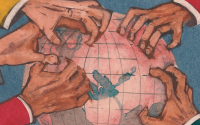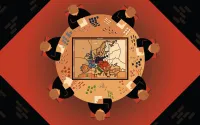16 May 2006Common Dreams
We see this kind of news story now and again. Sometimes we try to imagine the people behind the numbers, the human realities underneath the surface abstractions. But overall, the responses testify to journalism's failings -- and our own.
"Poor nutrition contributes to the deaths of some 5.6 million children every year," an Associated Press dispatch said early this month, citing new data from the U.N. Children's Fund. And: "In its report, UNICEF said one of every four children under age 5, including 146 million children in the developing world, is underweight."
The future is bleak for many children who will be born in the next decade. As AP noted, "the world has fallen far short in efforts to reduce hunger by half before 2015."
Reading this news over a more-than-ample breakfast, I thought about the limitations of journalistic work that is often done with the best of intentions. Try as they might, reporters and editors don't often go beyond the professional groove of the media workplace. Journalists routinely function as cogs in media machinery that processes tragedy as just another news commodity.
Many people are troubled by the patterns of negative events around the world. And hunger is especially disturbing; in an era of prodigious affluence for some, the absence of basic nutrition for huge numbers of human beings is a basic moral obscenity. Across the spectrums of culture, faith and ideologies -- whether remedies might seem to lie in religious charity or governmental action -- heartfelt desire to reduce suffering is very common.
News outlets are adept at producing vivid stories about misfortune. Those stories might be emotionally affecting or even politically mobilizing in terms of relief efforts. But the overarching matter of priorities is not apt to come into media focus. In general, corporate-employed journalists are not much more inclined to hammer at the skewed character of national and global priorities than corporate chieftains or government officials are.
In a world where so much wealth and so much poverty coexist, the maintenance of a rough status quo depends on a sense of propriety that borders on -- and even intersects with -- moral if not legal criminality. The institutional realities of power may numb us to our own personal sense of the distinction between what is just and what is just not acceptable.
On this planet in 2006, no greater contrast exists than the gap between human hunger and military spending. While international relief agencies slash already-meager food budgets because of funding shortfalls, the largesse for weaponry and war continues to be grotesquely generous. The globe's biggest offender is the United States government, which at the current skyrocketing rate of expenditures is -- if you add up all the standard budgets and "supplemental" appropriations for war -- closing in on a time when U.S. military spending will reach $2 billion per day.
This is what Martin Luther King Jr. was talking about in 1967 when he warned: "A nation that continues year after year to spend more money on military defense than on programs of social uplift is approaching spiritual death." Such an occurrence isn't sudden; it overtakes us gradually, becoming part of the normalized scenery.
Journalism, in its prevalent incarnations, has a strong tendency to blend into that scenery. And whether you're working in a newsroom or watching in a living room or reading at a breakfast table, it takes a conscious act of will to look at the big picture -- and challenge the reigning priorities that are simultaneously quite proper and horrific.
We're encouraged to see high-quality journalism as dispassionate, so that professionals do their jobs without advocating. But passive acceptance of murderous priorities in our midst is a form of de facto advocacy. It's advocacy of the most convincing sort -- by example.
A hoary cliche says money makes the world go 'round. The extent to which that's true may be arguable. But deeper questions revolve around the priorities that ought to determine the profoundly important choices made by individuals and institutions. Journalism can't answer those questions. But journalism should ask them.
Norman Solomon's latest book is "War Made Easy: How Presidents and Pundits Keep Spinning Us to Death." For information, go to: www.WarMadeEasy.com






